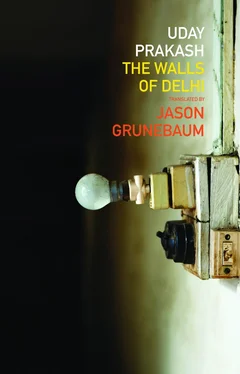‘That’s good! And so the brotherhood enlarges.’ Vijay Tiwari chuckled at himself and turned to the food joint. ‘Keep an eye on Bisnath, Panditji, and thanks for giving him a lassi to drink, and put it on my tab, and, oh, he’s just a little off his rocker.’
‘Don’t worry yourself about it! Not one bit! All in a day’s work! I’ll put him back on his rocker!’
The Tata Sumo sped off, leaving Mohandas covered in a cloud of dust and exhaust.
He stood perfectly still, grabbing hold of the lamppost. Was this some movie where a scene had just wrapped up, and he was a character trapped inside? Or was it some twisted nightmare?
Fatty’s Vaishnav Vegetarian Foodstop’s light-skinned, beady eyed, middle-aged fat sweetmeat proprietor, Nand Kishore, held out a glass of lassi.
‘Bisnath, oh Bisnath! Come and drink your lassi!’
Mohandas was leaving Lenin Nagar market and walking to the bus stand when he noticed a disturbed-looking man coming toward him. A little bag was slung over his shoulder, his pants were washed out, and coming apart at the seams. He came up to Mohandas and stopped.
‘Do you know where Suryakant’s flat is in Lenin Nagar, brother?’
Mohandas remembered seeing that name on a nameplate when he’d been looking for Bisnath’s house. He tried to remember.
‘Keep going straight ahead and you’ll see Matiyani Chowk at the big intersection, and ask someone, it’s not far from there.
The man started to leave and Mohandas asked him softly, ‘Whose apartment are you looking for?’
‘Suryakant’s! From a village near Unnao.’
‘What’s the name of his village?’
‘Gadhakola!’
‘And what’s your name’
The man hesitated. His lips trembled, his deep-set eyes began to well up, and in a thin, gravelly tone, a rough sound emerged.
‘Suryakant! I’m Suryakant from Gakhakola!’
And with that he turned and shuffled toward Lenin Nagar.
***
(It’s a story that takes place at the time when every government of every country on earth was promoting the same economic policies and playing the same political games, and when even the biggest billboard in the world can’t cover up the massive chasm that has opened up between rich and poor.
It’s the time when the revolutionary forces of the exploited and downtrodden from the early twentieth century were busy playing a game of chess to form coalition governments, lower the price of gas, and tighten their rule over the poor. And the time when a groundbreaking, historic consensus emerged among all parties in this twenty-first century postmodern democracy to cripple and crush all of the decent people of this country, the ones who get by with hard work and talent. Politics assumed the form of any means of power that’s used to exercise control, perpetrate injustice, and oppress the citizenry.)
***
Mohandas returned home at eleven. Everyone had been eagerly awaiting his return. Kasturi had made rice, dhal, and an okra khuthima. She’d also stone-ground some green mango chutney.
Devdas and Sharda had already eaten and were asleep. Kaba was lying on the cot in the courtyard coughing away. ‘Three times today he’s spat up gobs of lung with the blood,’ Kasturi informed him. Putlibai was sleeping next to him on the rug spread out on the floor beside the cot. Kasturi had waited to take her meal and still hadn’t eaten; she ladled out his food and hers, then covered them with a lid.
Mohandas took off his clothes and wrapped himself in an angocha in order to wash up before eating; all the cuts and bruises were visible. The marks gave Kasturi a fright.
‘What happened? Where did all those cuts come from?’ she said, carefully examining his body with her hands. ‘My god! These aren’t just little scratches.’ Mohandas quietly washed his hands and face, the cool water rinsing off the fatigue of the day, refreshing his whole body. Next to the washbasin was a good-sized jasmine plant in full flower; its scent filled the courtyard. He drew in a deep breath, filling his lungs with the sweet smell, closed his eyes for a moment, and incanted the name of his satguru, Kabir.
Kasturi removed the cover from the thali, releasing the smell of the rice into the courtyard. It was lohandi, an old stash Putlibai had put in the back of their rice bin and forgotten about, until today, when, remembering it, she groped around until she found the little bundle. Mohandas ate it with relish, and his fingers were covered in the mango chutney.
‘The bisaindhi mango tree’s bursting with fruit. We should get at least a couple of thousand for them, should I go pick and sell ‘em tomorrow?’ Mohandas said, before letting out a big burp to signal his satiety. ‘You must do some kind of magic to make food taste as good as this! Mix together your mango chutney, rice and a good appetite, and that’s what I call heaven!’
Kasturi’s eyes welled up a little. She knew that another calamity had befallen Mohandas that day, one he’d keep hidden from her forever.
That night Kasturi instantly fell asleep after a long day and late night, but sleep didn’t come to Mohandas for a while. He kept getting up, downing glass after glass of water. Some sort of storm was swirling around in his head, a terrible typhoon of disquiet.
Mohandas went to the Oriental Coal Mines once or twice more, but the trips turned out to be pointless since a rumour had been spread throughout Lenin Nagar that some loony popped up every couple of weeks claiming that he was the real depot supervisor, Mohandas, BA. Call him Bisnath and watch him go mad and say all sorts of crazy stuff.
He’d been defeated; Mohandas gave up on going to the coal mine. Day and night, he couldn’t calm down. He stayed up all night by the sandy bank of the Kathina, quietly regarding the stars. In the village, Kabirpanthis were considered merely a low weaver or thatcher caste. Were they a scheduled caste or an adivasi or an aboriginal group? It was still unclear, according to the official government gazette. After the census ten years ago ‘bamboo cutter’ was tacked on to their caste description; on other papers ‘Hindu’ was indicated as their religion and ‘Indian’ for nationality. Their numbers were small, and none of them took any significant part in any of the political parties, never mind holding any government positions; so here too Mohandas became the butt of many jokes. The high-casters and rich folk asked him in passing, ‘So, how’s the job hunt going, Moh-hun-ah?’
‘Take the job of looking after Vijay Tiwari’s water buffalo,’ someone advised him. ‘At least you won’t have to worry about putting a little bread on your plate. Make Kasturi happy, too. She wouldn’t have to walk around barefoot.’
Others told him he should go visit Bisnath in Lenin Nagar, throw himself at his feet and offer to be his servant. Mohandas began to avoid the higher-ups of his village. He’d see them and get lost fast.
But it’s not as if his fellow villagers didn’t have any sympathy for him. Most of the people had genuine feeling for him, and wanted to help him out one way or another. But these were the same people who themselves were caught in some kind of fix. There wasn’t one among them who had any real pull. They quietly did what they needed to do to get by with their own sweat and tears.
Ghanshyam was one of these. Though a Kurmi by caste, he wasn’t poor. He had twenty acres of land, and had bought a tractor with a loan from the bank. He grew beans and vegetables and rented out his tractor. And yet it was still tough for him to meet his monthly bank payments of seven thousand. The market price for wheat and other crops about to be harvested was below cost in the market. A farmer named Bisesar from nearby Balbahra village had taken out a loan from the Grameen Bank in order to plant soya beans; a couple of months ago, in order to save his farm from auction, he climbed up a powerline, touched a live wire and died. Small farmers and farm workers were quitting village life and coming to the city in droves; this made Ghanshyam uneasy.
Читать дальше










